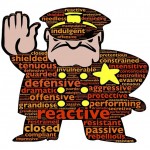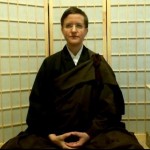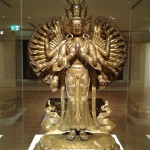 [continued from previous page] Imagine you are in the embrace of your mother and she is offering you unlimited, unconditional love. (If your mother didn’t or doesn’t actually offer that, imagine a mother who could.) As you rest in her arms, probably sobbing gently as her love helps heal your inevitable wounds, you feel more confidence that you are acceptable just the way you are. With all your warts, foibles, tantrums, and limitations, someone sees you as precious, loveable, and worthy. Someone sees you as special without having to compare you with anyone else in the world. That ease, acceptance, and inner healing you feel? That’s part of a Buddha’s Way of Being.
[continued from previous page] Imagine you are in the embrace of your mother and she is offering you unlimited, unconditional love. (If your mother didn’t or doesn’t actually offer that, imagine a mother who could.) As you rest in her arms, probably sobbing gently as her love helps heal your inevitable wounds, you feel more confidence that you are acceptable just the way you are. With all your warts, foibles, tantrums, and limitations, someone sees you as precious, loveable, and worthy. Someone sees you as special without having to compare you with anyone else in the world. That ease, acceptance, and inner healing you feel? That’s part of a Buddha’s Way of Being.
Imagine you are facing incredible difficult and painful circumstances, but you are determined not to run away from them because you need to protect and take care of that which is most important to you – your children, loved ones, or deeply held values. Nothing has even been clearer to you than what you need to do right now. You feel no doubt whatsoever, but not because you’re right in some absolute sense. Right and wrong have nothing to do with it. The clarity, settledness, strength, determination, and willingness you feel? Part of a Buddha’s Way of Being.
Imagine someone has you taste a new kind of food and then asks how you like it. You describe your experience and feelings – whether you liked the food and how much, whether you found it salty or sweet, crunchy or creamy. The person really wants to know what you think, so you speak freely. As you describe your experience, no part of you wonders if what you’re saying is true in some absolute sense, or whether you are really in touch with your “real” experience or not. That centeredness in your own direct experience, without it even being a big deal to be centered in your own direct experience? Part of a Buddha’s Way of Being.
Imagine you have reached the end of your life, and you lay there on your deathbed surrounded by loved ones. You know this is it. The story of your life is complete. No more can be done. You’re not without some sadness and regret, but you’re reconciled to things being as they are, and for the most part you’re happy and grateful. The long to-do list can be torn up and thrown away. The sense of peace and completeness you feel? Part of a Buddha’s Way of Being.
Fortunately, the practice of Unified Presence does not involve imagining all of those scenarios and trying to create a certain kind of feeling or mind-state. It is more direct than that.
When you have a moment of wakefulness, come home to yourself. Notice the many ways you are resisting the way things are and let go of the resistance. Notice the ways you are rejecting certain things about yourself (such as your lack of mindfulness!) and hold yourself in that mother’s embrace of unconditional acceptance. Show up for your direct experience without questioning its validity in any way. Let go of the agenda of both the ego and the super-ego and ask yourself what you really want. Cast aside all effort to be anyone other than who you are, when you are, where you are, because your life needs you and you can’t actually be anyone other than who you are, when you are, where you are.
Essentially, this Radical Practice of Unified Presence is bringing all of parts of yourself together. Your aspiration and your selfishness, your love and your lust, your inner lazy glutton and your inner ascetic. Your body, your thoughts, your hopes, fears, passions, and shame. Your projects, habits, opinions, perceptions, blood, bones, and mucus.
This is what it means to be wholehearted. To be half-hearted means to hold something back, or to do something without enthusiasm because you don’t really want to do it. In order to be half-hearted you have to be divided – part of you wants one thing, while part wants another. Of course, this kind of inner division is part of being human, and the Radical Practice of Unified Presence is not about picking a winning side or pretending no inner conflict exists. Instead, to be wholehearted, we choose how to be in this very moment. We may be in the midst of huge inner turmoil or a prolonged decision-making process, but in this very moment we can be wholehearted with exactly that. No apologies.
In the Radical Practice of Unified Presence we just say internally, “Now is the time.” Now is the time to show up completely. Now is the time to enjoy yourself. Now is the time to appreciate things fully. Now is the time to give yourself a break. Now is the time to say what you mean. Now is the time to open your heart. Now is the time to embrace your life wholeheartedly. We stop waiting to become someone else. We stop waiting to become enlightened, or to perfect mindfulness, or to finally gain access to the secret of complete happiness.
At this point it’s very important to point out that the Radical Practice of Unified Presence is not the Radical Practice of Deciding I’m Super Cool and Can Do Anything I Want. The latter practice involves stories about yourself. It’s like getting egotistical because your mother thinks you’re great, or imagining yourself as a self-righteous martyr because you’re enduring some difficulty while simply doing your duty. It’s like describing what you think of a particular food and presenting it as Truth-with-a-capital-T because your sense of taste is so superior to that of others, or reaching the end of your life and congratulating yourself that so many people love you. The Radical Practice of Deciding I’m Super Cool and Can Do Anything I Want is getting a taste of a Buddha’s Way of Being and then trying to bottle and sell it.
The moment you start drawing conclusions and telling stories, you’re no longer mindful (to use the term we’re all more familiar with). Your self is no longer unified, because no matter what the part of you that thinks “I’m great and can do no wrong” is saying, part of you knows you are terribly limited and intransigently self-interested. The Radical Practice of Unified Self, on the other hand, denies nothing and assumes nothing. It happens in this very moment.
When, in the practice of Unified Self, you ask yourself what you really want, you’ll find that you basically want happiness and not suffering. You’ll notice that how other people feel affects you, so you’ll know their fate is not independent of yours. You’ll find you want to be awake for your life. You want to be authentic and loved. Basically, you’ll find out you’re a good person who can trust yourself.
Sure, sometimes our habit energy makes us want to flirt with someone who’s not our partner, or to elbow in front of someone in line, or to eat too much chocolate cake. But if you do the practice of Unified Presence you’re much more likely to connect with the part of you who treasures your intimate partnership, values the opportunity to be generous, and enjoys feeling healthy. As part of the process of unification, you make your self-righteous super-ego and your mischievous id sit down together like two petulant, squabbling kids required to put aside their argument in order for the family to have a peaceful dinner. There’s a chance the adult in the house will be able to make a wise and compassionate decision in the meantime.
The most important aspect of my “Radical Practice of Unified Self” is that I’ve found it much easier to sustain than “mindfulness,” at least in the sense mindfulness is a consciously aware state that’s either free from thought or involves taking the role of detached observer. Instead of trying concentrate on “only what is here and now” and avoid getting sucked back into the dream of thought, I try to inhabit this moment more wholeheartedly. After all, it’s just the bullshit in my mind about how “I’m not enough” and “this isn’t enough” that keeps me separated from my life instead of letting me be intimate with it. Basically, instead of making a practice of thinking about what I shouldn’t do (get lost in the dream of thought), I channel my passion into being as fully alive as possible.
When you’re practicing Unified Self, you aren’t necessarily consciously aware of practicing Unified Self. Sometimes you will be more aware of it than other times. It’s possible to be wholeheartedly engaged in something and have it take up all of your mental and emotional bandwidth so there’s nothing left for observing yourself being wholehearted.
So how do you know if you’re practicing Unified Presence if you won’t necessarily be consciously aware of doing so? Upon reflection, you’ll know. Recollect a period time spent absorbed in thought or in some activity, and notice whether you were divided during that time. Chances are, you were, even if subtly. You were having dinner with friends but looking forward to it being over because you found it kind of boring, and then you felt a little guilty for being bored. You were wrapped up in project you love but periodically found yourself getting irritable when things didn’t work the way you wanted them to, revealing how part of you was more interested in the outcome of the project than in wholeheartedly doing it.
By the way, when you realize you haven’t been Unified for a time, forget about it and simply Unify yourself right away! If you beat yourself up for not being unified, you may end up undermining the effectiveness of the practice to get you to the moon, a.k.a. a Buddha’s Way of Being, by making the whole process stressful and unpleasant.
When you’re doing the Radical Practice of Unified Self, there is a certain kind of awareness present that otherwise isn’t. However, it’s kind of subtle, and it’s incredibly difficult to describe without inviting our minds to separate out “me” from “my awareness” from “what is going on,” and this Buddha-awareness is not divided. The words that most accurately evoke this awareness for me are “aliveness,” “sentience,” “wholehearted being,” or Uchiyama Roshi’s “the self doing self.”[ii] The awareness that is part of a Buddha’s Way of Being is basic, natural, and ordinary. It isn’t removed, thoughtless, rarefied, or limited to things in your immediate surroundings that you perceive through the five senses. In some situations it coolly observes, while in others it participates in leaping, laughing, crying, analyzing, and creating. This awareness will be present, but it won’t constrain activity.
I beg Shakyamuni Buddha’s forgiveness, and the patience of all the great Buddhist teachers of subsequent generations, for my arrogance in implying I have found something new, or managed to improve on their teaching techniques. Still, I love my spiritual tradition for the fact that it invites all of us to point at the moon in our own way, using our own words, images, and approaches. When I turn to the ancestors to corroborate what I have discovered in the course of my own practice, I am pleased to read the words of Zen master Lin-Chi:
“Followers of the Way, the outstanding teachers from times past have all had ways of drawing people out. What I myself want to impress on you is that you mustn’t be led astray by others. If you want to use this thing, then use it and have no doubts or hesitations!
“When students today fail to make progress, where’s the fault? The fault lies in the fact that they don’t have faith in themselves! If you don’t have faith in yourself, then you’ll be forever in a hurry trying to keep up with everything around you, you’ll be twisted and turned by whatever environment you’re in and you can never move freely. But if you can just stop this mind that goes rushing around moment by moment looking for something, then you’ll be no different from the patriarchs and buddhas. Do you want to get to know the patriarchs and buddhas? They’re none other than you, the people standing in front of me listening to this lecture on the Dharma!”[iii]
When Lin-Chi talks about the “mind that goes rushing around moment by moment looking for something,” I don’t think he’s not talking about our tendency to think about stuff. That’s how I used to understand his words, but thinking is just part of being human (and frankly, it’s a great part of being human). I think Lin-Chi is referring to something deeper and subtler: the part of us that is looking for something else, to be someone else, to exist in a different world than we live in right now. That part drives the mind to go rushing about – sometimes even in the pursuit of some state called mindfulness. Can you go ahead and think, speak, and act without rushing about?
[i] http://www.mindful.org/jon-kabat-zinn-defining-mindfulness/
[ii] Opening the Hand of Thought by Kosho Uchiyama. Wisdom Publications, 2004.
[iii] The Zen Teachings of Zen Master Lin-Chi, translated by Burton Watson. Columbia University Press, 1993.












